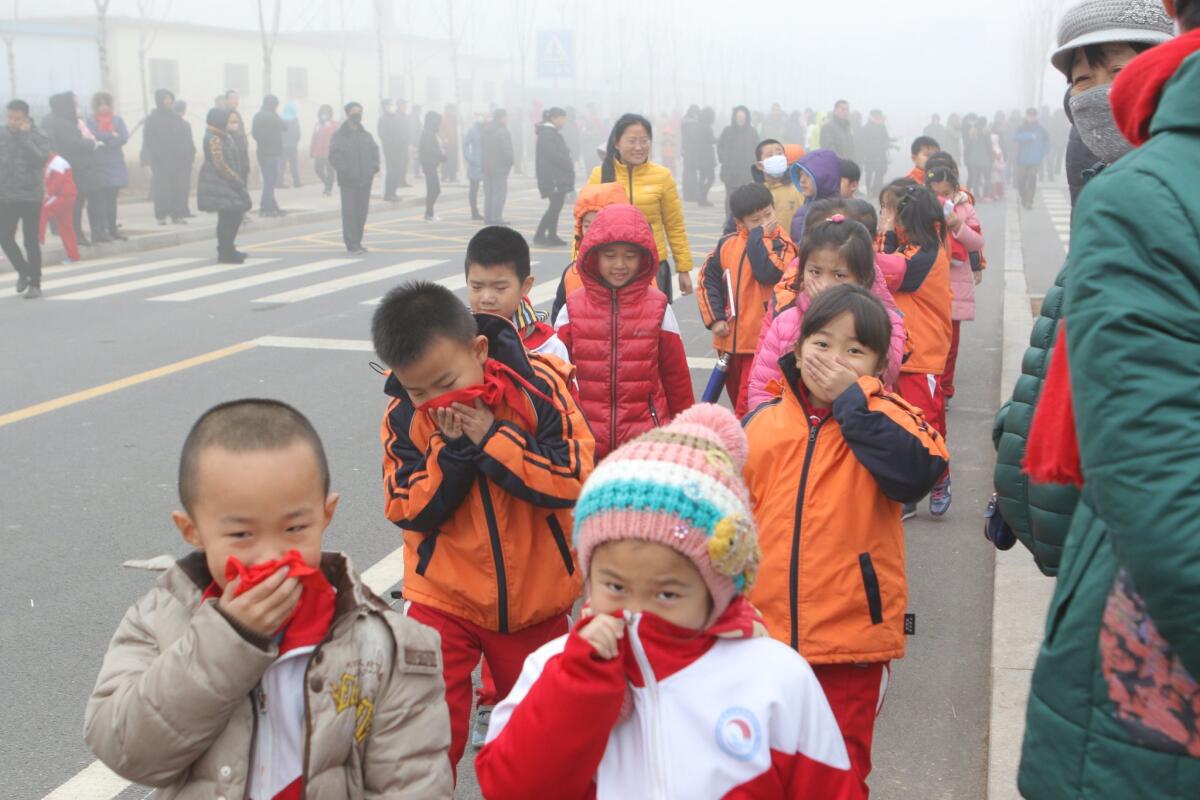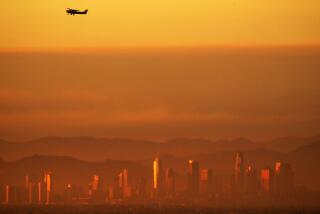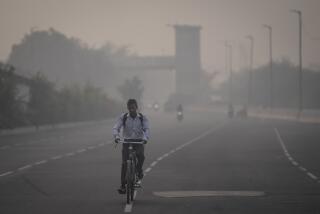Beijing’s smog may be thick, but parents say the bureaucracy is impenetrable

Pupils cover their noses after school in heavy smog on Dec. 23 in Binzhou, China.
- Share via
reporting from beijing — It was a one-two punch: first came the air pollution, then the bureaucracy.
Sara Zhang, like many Beijing residents, has taken precautions at home to protect herself and two children from the city’s notorious air pollution. Yet her 7-year-old son’s public primary school, Yunhe Elementary, has not installed any air purifiers — humming, boxy machines common in the city’s expensive private schools — leaving its students no choice but to breathe eye-watering toxic air.
Zhang, 39, recently banded with other parents to offer a few air purifiers to the school at no cost. Yet school administrators refused, and their reason — that the government has not approved the purifiers’ use — led her down a Kafkaesque rabbit hole.
“We called the [local] education committee, and the education ministry, and we got different answers from everyone who picked up the phone,” said Zhang, 39. “Some said that no air purifiers have been deemed acceptable for classrooms, some said we should write up suggestions and they’d report to their superiors. But everyone basically told us that it’s impossible to have them installed.”
This December has ranked among Beijing’s worst air pollution months in recent memory — authorities announced two “red alert” smog warnings, forcing school closures across the city.
Join the conversation on Facebook >>
Yet even on normal days, the city was shrouded in a toxic haze, and the reticence of many public schools to install air purifiers — many of which are proven to improve indoor air quality — has infuriated parents and underscored the Chinese bureaucracy’s inability to deal with some immediate effects of the country’s environmental crisis.
A representative of the city’s official school board, contacted by phone on Monday, said that the board does not “encourage” schools to accept air purifiers from parents. “We encourage schools to suspend classes on heavy pollution days,” she said.
“We’re working with the Ministry of Education and experts from Tsinghua University on what kinds of air purifiers are fit for schools, and we’ll come up with a city-wide plan for air purification in schools,” she said. “This is not just a job for the Ministry of Education — it also involves the State Administration of Work Safety and the Ministry of Environmental Protection.” She did not give a timeline for the plan’s implementation, and she hung up before giving her name.
Experts say China’s air pollution exacts a tremendous toll on human health. According to a 2013 study in the British medical journal the Lancet, between 350,000 and 500,000 people in China die prematurely every year because of smog.
Many government departments have installed air purifiers in their offices.... Public officials are apparently more important than children.
— China’s state-run Global Times newspaper
“The nation’s air quality has become so terrible that many government departments have installed air purifiers in their offices — all paid for with taxpayers’ money,” said a Sunday commentary in the state-run Global Times newspaper. “Public officials are apparently more important than children. Few if any public schools in China are equipped with air-purifying machines despite the fact that public schools are funded by tax payers.”
A 30-year-old employee at a state-owned enterprise said that her 18-year-old stepdaughter’s schools had not installed air purifiers — and that after the recent smog siege, she has decided to soon move her family to Hainan, an island in China’s deep south.
NEWSLETTER: Get the day’s top headlines from Times Editor Davan Maharaj >>
“Smoggy days in Beijing are so, so common now — this happens at least once or twice a week,” said the woman, who gave only her surname, Wang, so that she could criticize the government without fear of official retaliation. “They can’t make students stay at home every week indefinitely. And a lot of parents work full-time — they can’t stay home from work once or twice a week to take care of their children.”
“The pollution is so bad it makes life in this city practically unlivable.” she added. “This is such a massive problem, and the government isn’t solving it — so what kinds of problems is the government here to solve?”
Tommy Yang in the Times’ Beijing bureau contributed to this report
Follow @JRKaiman on Twitter for news from Asia
ALSO
South Korea and Japan reach deal on World War II sex slaves
New Facebook service ignites battle over net neutrality in India
South Korean single mothers turn to theater to strike back against stereotypes
More to Read
Sign up for Essential California
The most important California stories and recommendations in your inbox every morning.
You may occasionally receive promotional content from the Los Angeles Times.













